My current conjecture is that the examples of broken JSON syntax in the paper somehow accidentally caused something like second-order prompt injection in Google Scholar's indexing pipeline. But there's only one way to find out ^^^
14.07.2025 17:37 — 👍 1 🔁 0 💬 1 📌 0
Hilarious! It looks like Google Scholar is pulling citations for a different Kirschner et al. paper from 2006.
I wonder if one could use the technique proposed in "Debugging inputs" to identify what causes this anomaly. Gonna need Lukas to publish a *lot* of papers.
14.07.2025 17:33 — 👍 1 🔁 0 💬 1 📌 0
🚨 Our amazing #FUZZING'25 keynotes are online!
"Constraining Fuzzing without Paying Too Much" by Miryung Kim
youtu.be/L90MBb6NLBE
"Are you sure you belong in academia?" by Will Wilson
youtu.be/qQGuQ_4V6WI
// @mboehme.bsky.social, László Szekeres, @rohan.padhye.org, @ruijiemeng.bsky.social
29.06.2025 07:35 — 👍 11 🔁 6 💬 1 📌 0
The limit applies to references too? Preposterous!
17.06.2025 17:24 — 👍 1 🔁 0 💬 1 📌 0
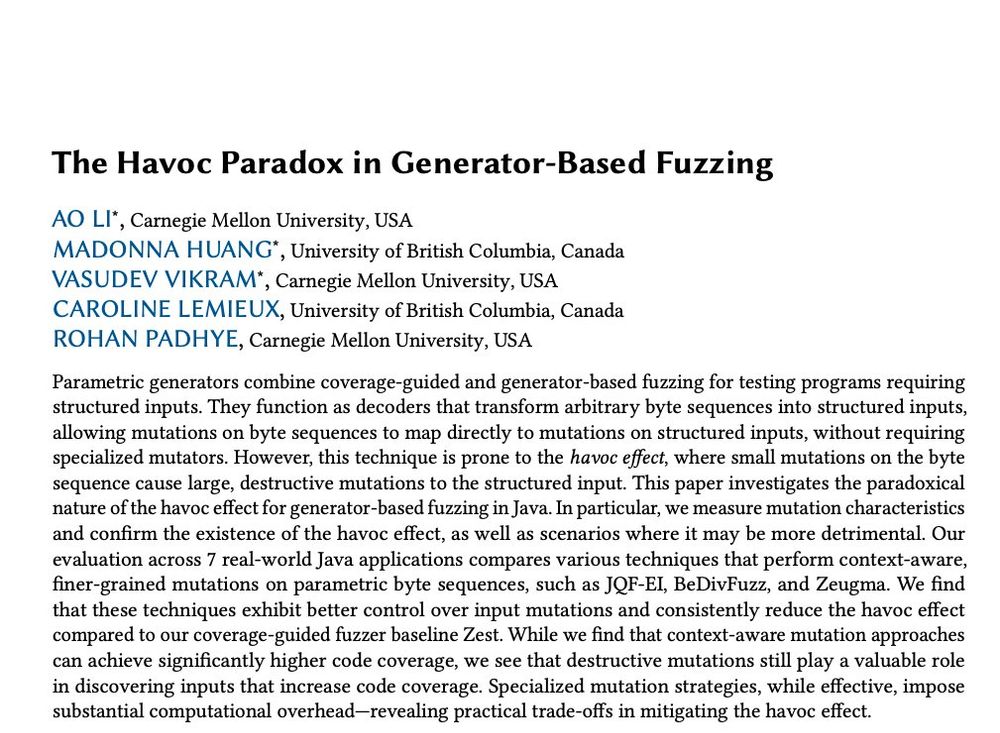
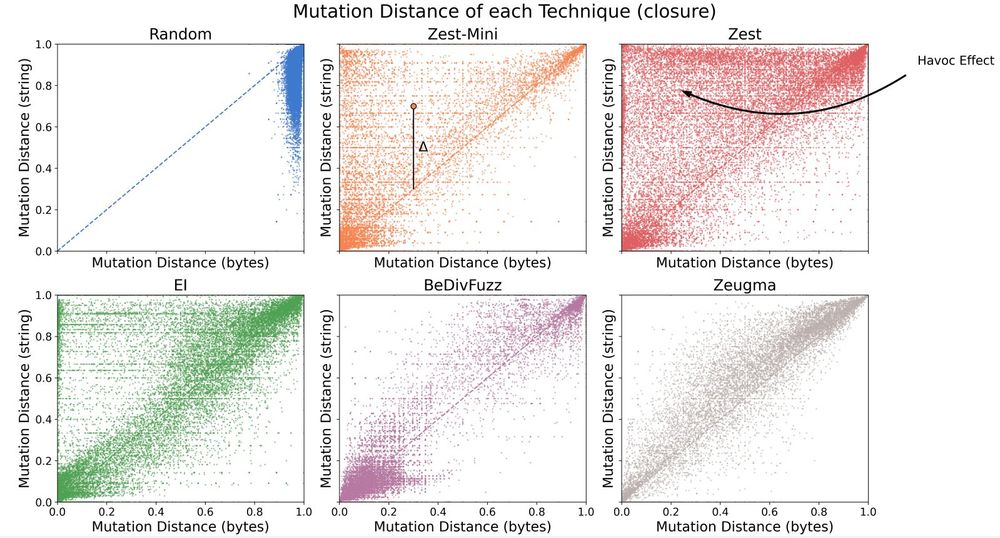
Just Accepted to ACM TOSEM!
The "Havoc Paradox" is about the relationship between byte-level fuzzer mutations and their effect on the inputs produced by generators for structured strings (e.g. XML/SQL). Can disruptive mutations be controlled? Should they be? Find out.
📄 dl.acm.org/doi/pdf/10.1...
06.06.2025 19:02 — 👍 21 🔁 3 💬 2 📌 1
🖊️ Register here: ntnu.eventsair.com/fse2025-isst...
(FUZZING is a co-located workshop)
28.05.2025 09:41 — 👍 5 🔁 3 💬 0 📌 0
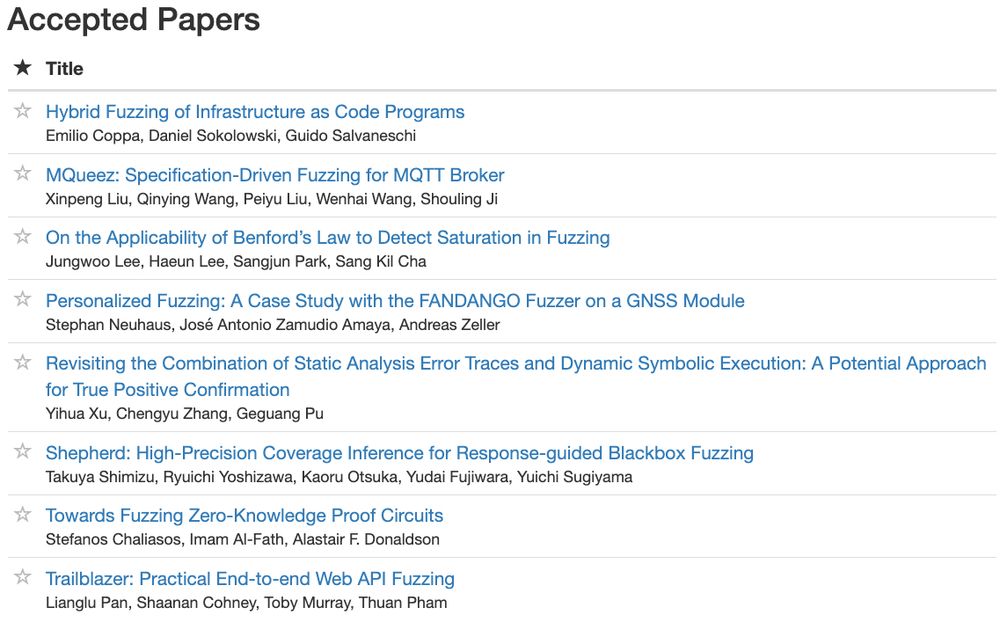
List of Accepted Papers at the FUZZING Workshop
We also have an excellent program of research talks and *fuzzing nuggets*. Detailed schedule coming soon.
conf.researchr.org/home/issta-2...
27.05.2025 18:49 — 👍 3 🔁 3 💬 0 📌 0


We're excited to announce two keynote speakers for the #FUZZING'25 workshop (part of @issta_conf at Trondheim, Norway):
[*] Will Wilson, CEO and Co-Founder of Antithesis
[*] Miryung Kim, Professor and Vice Chair of Graduate Studies at UCLA
conf.researchr.org/home/issta-2...
27.05.2025 18:49 — 👍 8 🔁 3 💬 1 📌 1
The JQF repo is now both popular enough (700+ stars) and contains enough buggy/vulnerable code as sample fuzz targets that we're getting occasionally spammed with crappy AI-generated patches.
I can't imagine what bigger OSS projects are dealing with right now.
27.05.2025 17:21 — 👍 1 🔁 0 💬 0 📌 0
Congratulations!
05.05.2025 14:46 — 👍 1 🔁 0 💬 0 📌 0
Delighted to receive an ACM SIGSOFT Distinguished Award for this work... It's about time!
Proud of the PASTA Lab students, including our visiting undergrads :-)
29.04.2025 19:51 — 👍 11 🔁 0 💬 0 📌 0
![Text highlighted from a research paper that says "To the best of our knowledge, there is no existing search-based testing approach for productiongrade AV software, including [20], [21], [41]–[55] that: (i) uses our novel gene representation"](https://cdn.bsky.app/img/feed_thumbnail/plain/did:plc:nd3awjfrcf4gvvodwib7ydo4/bafkreiayhjtb5grftfpci2shhwzb7zuuw2lucvdn2okqxbar7g2di4xb4i@jpeg)
Text highlighted from a research paper that says "To the best of our knowledge, there is no existing search-based testing approach for productiongrade AV software, including [20], [21], [41]–[55] that: (i) uses our novel gene representation"
Love this argument: prior work does not use our novel idea.
31.03.2025 14:43 — 👍 6 🔁 0 💬 0 📌 0
Submission deadline for the Fuzzing workshop is tonight (AoE)! Send us those nuggets and research ideas.
Rohan
20.03.2025 19:09 — 👍 4 🔁 0 💬 0 📌 0
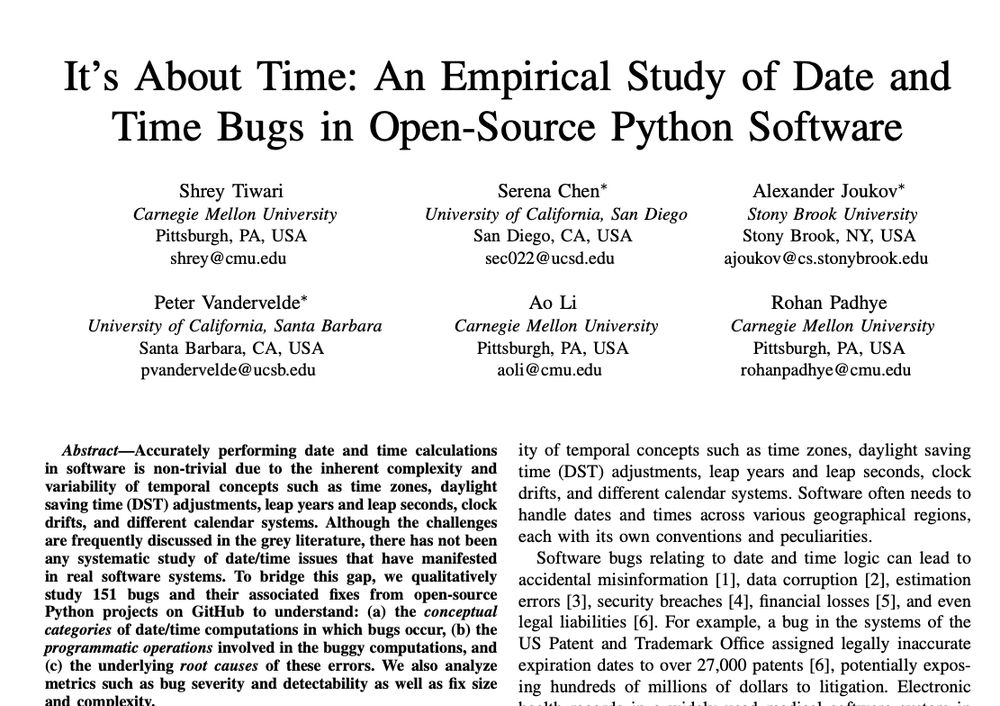
Paper titled "It’s About Time: An Empirical Study of Date and
Time Bugs in Open-Source Python Software". Authors List:
Shrey Tiwari
Carnegie Mellon University
Pittsburgh, PA, USA
shrey@cmu.edu
Peter Vandervelde∗
University of California, Santa Barbara
Santa Barbara, CA, USA
pvandervelde@ucsb.edu
Serena Chen∗
University of California, San Diego
San Diego, CA, USA
sec022@ucsd.edu
Ao Li
Carnegie Mellon University
Pittsburgh, PA, USA
aoli@cmu.edu
Alexander Joukov∗
Stony Brook University
Stony Brook, NY, USA
ajoukov@cs.stonybrook.edu
Rohan Padhye
Carnegie Mellon University
Pittsburgh, PA, USA
rohanpadhye@cmu.edu
Happy Daylight Savings Time to everyone in the US! A few more weeks for European Summer Time.
If you notice some of your apps glitching, don't be alarmed. Even ChatGPT can't write correct date/time code!!!
See more in our upcoming paper: rohan.padhye.org/files/dateti... (MSR'25 preprint)
10.03.2025 13:37 — 👍 5 🔁 0 💬 0 📌 2
It's always been a "response" for me.
The only time it was a "rebuttal" was when I explicitly thanked Reviewers A, C, and D for their valuable feedback.
23.02.2025 13:36 — 👍 8 🔁 0 💬 1 📌 0
I'm super excited about this new track at the #FUZZING'25 workshop. It's the academic version of thoughtful blog posts, but with a paper and talk for wider reach!
Submission deadline is in a month (March 20th)!
fuzzingworkshop.github.io
17.02.2025 19:00 — 👍 9 🔁 3 💬 1 📌 1

#FUZZING'25 CALL FOR PAPERS
──────
✨ New OC members:
* Ruijie Meng (@ruijiemeng.bsky.social; NUS)
* Rohan Padhye (@rohan.padhye.org; CMU).
✨ New paper type: Fuzzing Nuggets (short papers).
🔗 fuzzingworkshop.github.io
📅 20.March (Submission)
📅 17.April (Notification)
📅 28.June (Workshop)
17.02.2025 18:40 — 👍 19 🔁 11 💬 1 📌 0
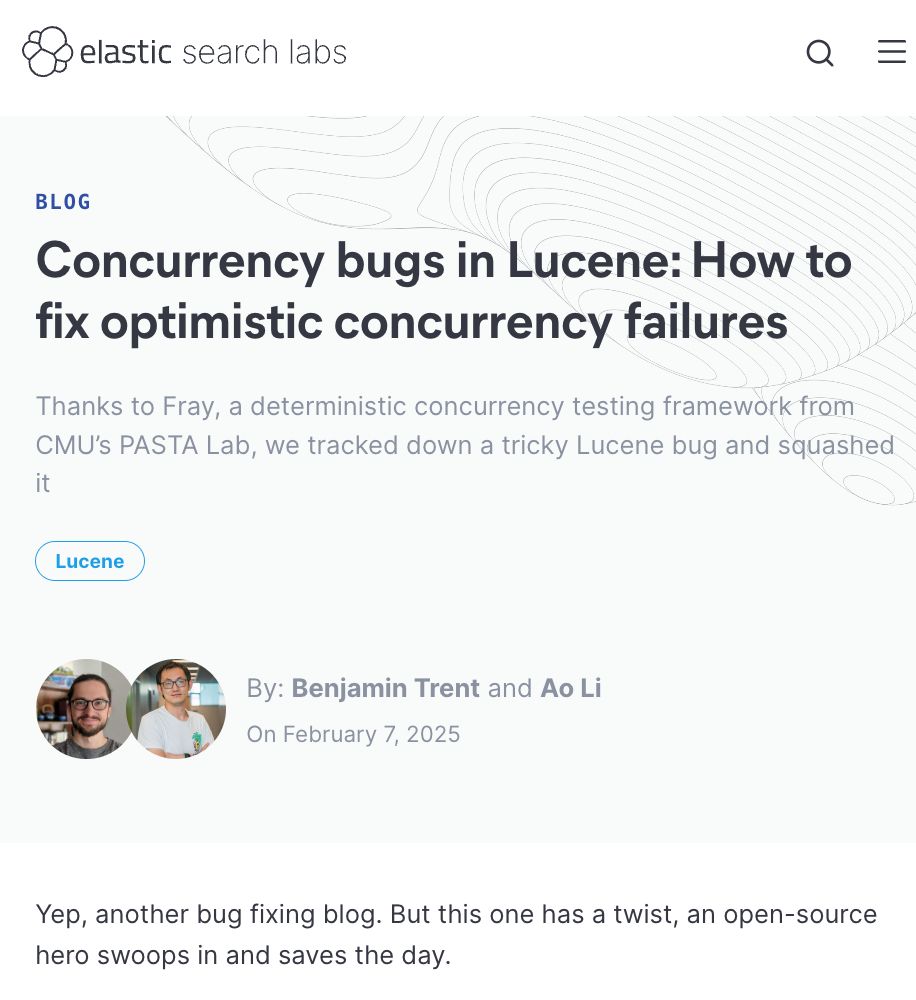
Blog post titled "Concurrency bugs in Lucene: How to fix optimistic concurrency failures" By Benjamin Trent and Ao Li (February 7, 2025)
Text reads: "Thanks to Fray, a deterministic concurrency testing framework from CMU’s PASTA Lab, we tracked down a tricky Lucene bug and squashed it"
Back to basics: Concurrency testing in Java!
Our new tool *Fray* correctly solves a 25+ year old problem for real-world software. See this feature from Elastic Labs about Fray's contributions to Lucene.
📰: www.elastic.co/search-labs/...
🔧: github.com/cmu-pasta/fray
📝: arxiv.org/pdf/2501.12618
07.02.2025 21:57 — 👍 20 🔁 4 💬 2 📌 0
Cite only the paper title for now, and submit a PDF without embedded fonts. They'll probably tell you to fix it and re-submit in 48 hours. Plenty of time to get an arxiv identifier :-)
19.12.2024 07:34 — 👍 10 🔁 0 💬 1 📌 0
Takeaway: Don't just fuzz and wait for bugs to show up. Measure what your inputs look like based on user-defined predicates, and things start making a lot more sense.
13.12.2024 16:38 — 👍 2 🔁 1 💬 1 📌 0
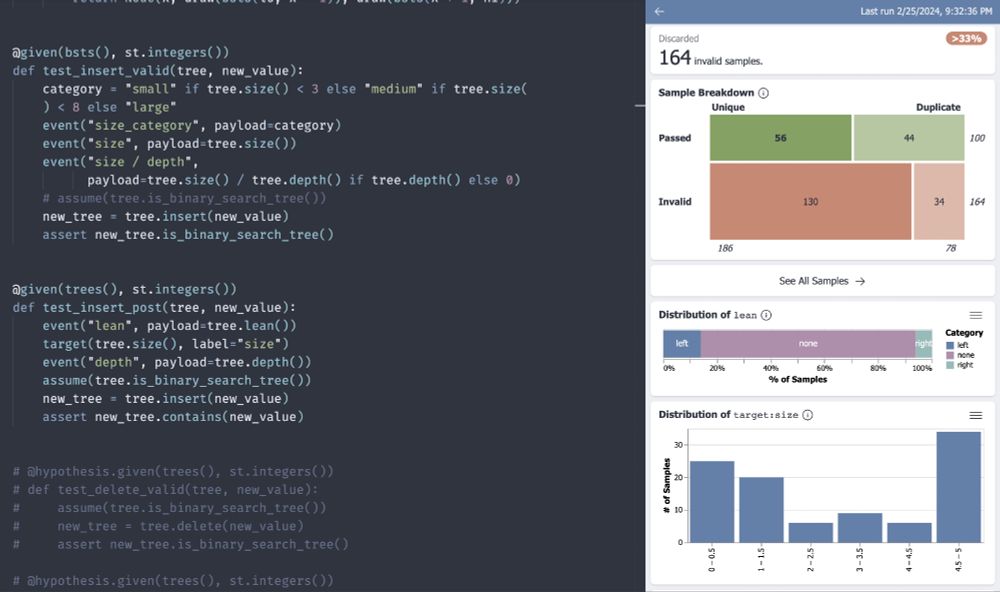
A screenshot with two columns. On the left, a Python property-based test annotated with `event(<predicate>)` statements. On the right, a visualization of how frequently event predicates have been excercised by random tests, plotted as histograms and tree-maps.
[3/3] Another similarly cool idea is "events" in Tyche (by @harrisongoldste.in et al.), which is a PBT visualization extension for VSCode. We've actually integrated Tyche into JQF now so it works with Java fuzzing! Check it out.
(Ref: github.com/tyche-pbt/ty..., github.com/rohanpadhye/...)
13.12.2024 16:38 — 👍 2 🔁 0 💬 1 📌 0
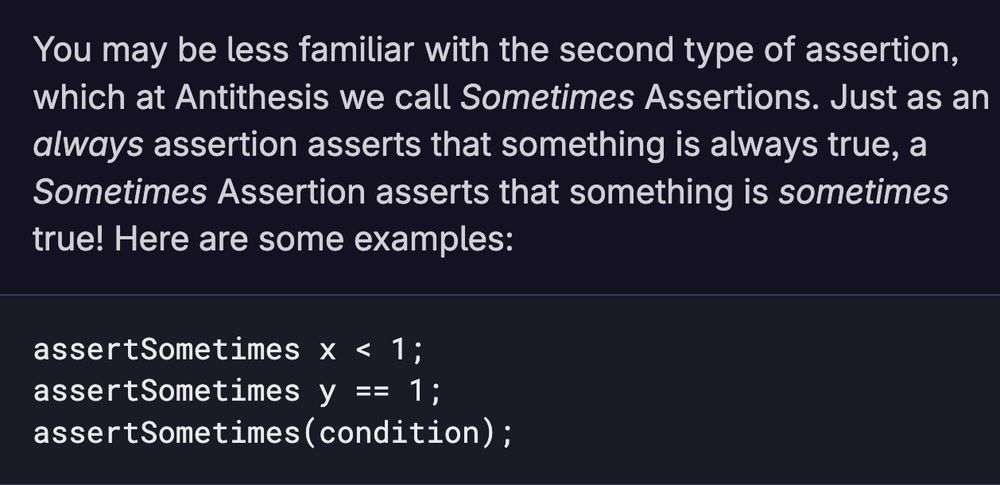
You may be less familiar with the second type of assertion, which at Antithesis we call Sometimes Assertions. Just as an always assertion asserts that something is always true, a Sometimes Assertion asserts that something is sometimes true! Here are some examples:
```
assertSometimes x < 1;
assertSometimes y == 1;
assertSometimes(condition);
```
[2/3] I like the "Sometimes Assertions" abstraction recommended by Antithesis, which generalizes code coverage to user-defined predicates, possibly interleaved with application logic. Maybe we should support these in JQF too.
(Ref: antithesis.com/docs/best_pr...)
13.12.2024 16:38 — 👍 2 🔁 0 💬 1 📌 0
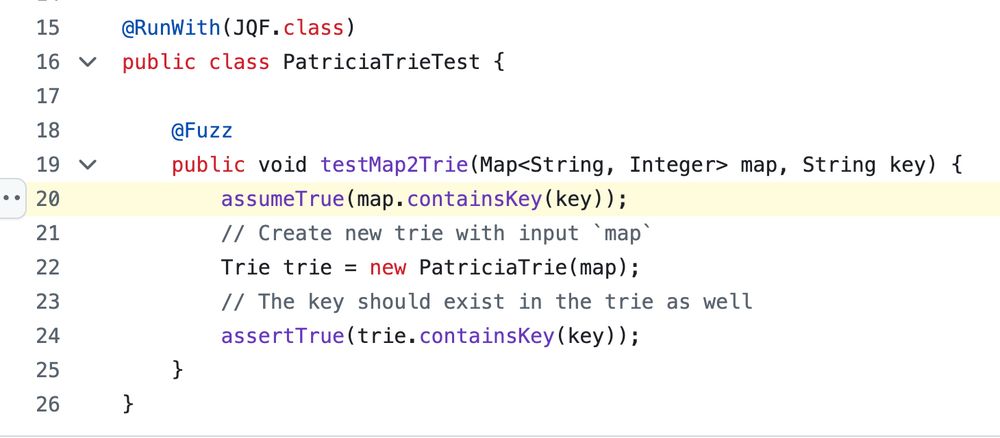
```
@Fuzz
public void testMap2Trie(Map<String, Integer> map, String key) {
assumeTrue(map.containsKey(key));
// Create new trie with input `map`
Trie trie = new PatriciaTrie(map);
// The key should exist in the trie as well
assertTrue(trie.containsKey(key));
}
```
How do you know whether random testing is working as expected?
[1/3] Long ago in JQF, we used `assumeTrue` to bias fuzzing towards *valid* inputs. This is powerful, but the abstraction is quite coarse if you have many properties.
(Refs: github.com/rohanpadhye/..., rohan.padhye.org/files/zest-i...)
13.12.2024 16:38 — 👍 7 🔁 0 💬 1 📌 0
And now that we’re all here, some work!🚨 Are Large Language Models Memorizing Bug Benchmarks? 🚨
There’s growing concern that LLMs for SE are prone to data leakage, but no one has quantified it... until now. 🕵️♂️ 1/
26.11.2024 16:06 — 👍 65 🔁 11 💬 2 📌 1
It was expected to happen once this year, because there are 366 days.
25.11.2024 18:01 — 👍 4 🔁 0 💬 1 📌 0
Now to find everyone else again.
20.11.2024 14:34 — 👍 0 🔁 0 💬 1 📌 0
Alright, I'm here!
20.11.2024 14:34 — 👍 4 🔁 1 💬 2 📌 0
Asst. prof. at NUS. Scaling cooperative intelligence & infrastructure for an automated future. PhD @ MIT ProbComp / CoCoSci. Pronouns: 祂/伊
Computer scientist at Imperial College London, specialising in programming languages, software testing, and formal verification. Leader of FastPL group: https://fastpl.doc.ic.ac.uk
A latent space odyssey
gracekind.net
At Carnegie Mellon University's Software and Societal Systems Department (S3D), we solve big, complex challenges at the critical intersection of technology and society.
Assistant Professor, Computer Science @ CO School of Mines
Brick Ontology for smart buildings
Knowledge graphs, databases, semantic interoperability
https://gtf.fyi
Database/storage
Flight/DataFusion/Arrow/Parquet
PhD student@UW-Madison
https://xiangpeng.systems
Mathematical Software Engineer
cheerleader, organizer, staff software engineer, databases
eatonphil.com
Associate Prof. of Databases @ Carnegie Mellon.
Assistant Professor at University of Notre Dame. Main Research Areas: Software Engineering, Security, Program Analysis.
PhD candidate in Systems @ UChicago. Working on software reliability & efficiency. Opinions, my own. Reposts are not endorsements. Personal website: https://bastoica.github.io/
CS Prof @ TU Wien (Vienna), prev DevAI @ Google, Probability @ Meta, Researcher @ MIT and Uni Zurich
https://jpolitz.github.io
Project leader, software infrastructure to support public policies @Inria. Programming languages, formal methods and the law. Co-creator of https://catala-lang.org.
I am A Panda. I work on systems and networking at NYU.
I mostly hang out at https://discuss.systems/@apanda
I'm a member of the imperial senate on a diplomatic mision to Alderaan.
Computer networking professor. 🇺🇲❤️🇵🇹, she/her, Dr. Sherry, Mamã, working at AS8!
www.justinesherry.com
Thinks about computing with humans and computing for humans. Assistant Professor of Computer Science. feldmanmolly.com
(he/him) Postdoc at the University of Maryland
I make tools that help developers to build trust in their software using techniques from PL, SE, and HCI.
Currently on the academic job market, looking for tenure-track positions!
https://harrisongoldste.in





![Text highlighted from a research paper that says "To the best of our knowledge, there is no existing search-based testing approach for productiongrade AV software, including [20], [21], [41]–[55] that: (i) uses our novel gene representation"](https://cdn.bsky.app/img/feed_thumbnail/plain/did:plc:nd3awjfrcf4gvvodwib7ydo4/bafkreiayhjtb5grftfpci2shhwzb7zuuw2lucvdn2okqxbar7g2di4xb4i@jpeg)





